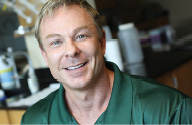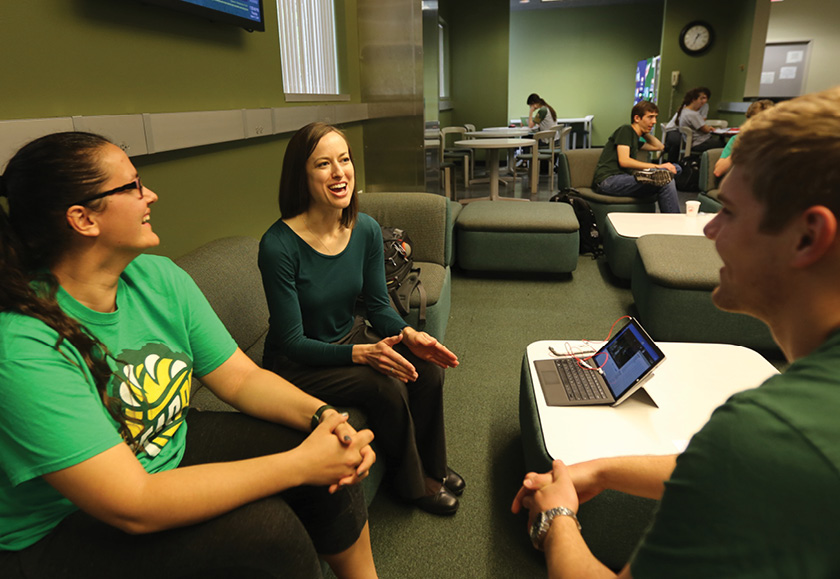Engineering the Future
he School of Engineering and Computer Science (ECS) celebrated 20 years as an academic unit in 2015 with continued growth in scholarship, research and Christian stewardship. Engineering students engage in academic studies that include ABET-accredited undergraduate programs. Opportunities also exist for graduate studies at the master’s and doctoral levels.
Baylor's engineering program is renowned for being academically rigorous, but that rigor allows flexibility to provide students with the opportunity to pursue areas of study about which they are passionate--something that has remained a hallmark of the program since its inception. Among its degree programs, the school offers engineering degree concentrations in biomedical, environmental, geopetro and humanitarian engineering, with other additional concentrations in the works.
This flexibility was one of the factors that attracted Mechanical Engineering Assistant Professor Joe Kuehl to Baylor, along with the opportunity to perform pioneering research at Baylor Research and Innovation Collaborative (BRIC). Kuehl conducts research on hypersonic boundary-layer stability and transition, as well as environmental fluid dynamics linked to oil-spill response on the Texas shelf.
"I do a variety of research, both on the geophysical side and aerodynamic side," says Kuehl, who holds a PhD in mechanical engineering and physical oceanography. "The engineering program at Baylor is growing, creating new opportunities to set up experiments that are cutting edge. You have the ability to be versatile; whatever your interest is, there’s a good chance that someone at Baylor is doing related research."
Dr. Scott James, a professor in the departments of geosciences and mechanical engineering, is an expert in environmental fluid dynamics and a proponent of cross-collaboration. His studies in surface-water systems relating to marine renewable energy and modeling algae growth in open-channel raceways for biofuels production particularly appeal to engineering students with an interest in the geo/petro concentration. He advises a post-doctoral fellow as well as graduate and undergraduate students in mechanical engineering, environmental science and electrical and computer engineering assisting in interdisciplinary research.
"Baylor fosters an environment for collaborative research, especially through groups like CRASR [the Center for Reservoir and Aquatic Systems Research] and TIE3S [The Institute of Ecological Earth Environmental Sciences]," says James, who is a member of both the center and the institute. "Also, as a faith-based university, Baylor puts emphasis on doing projects that help communities and underprivileged societies. Philanthropic work is a nice tie-in with the University’s mission."
Helping people improve their quality of life through Christian stewardship is at the heart of the concentration in humanitarian engineering. Through coursework, research and mission trips, students learn to serve in a variety of international relief, development and missions organizations. Students can also make meaningful hands-on contributions in developing countries and Waco through Engineers with a Mission, a Christian engineering student organization.
Teaching with a Christian perspective is something Dr. Jill Klentzman enjoys in her position as a lecturer in the Department of Mechanical Engineering.
"Baylor's emphasis on research and teaching and its emphasis on faith and sharing that with students in a community of people pursuing God and academics is what drew me to Baylor," she says.
Klentzman, whose research focuses on fluid dynamics and flow instabilities relating to the aerospace industry, mentors students in and out of the classroom to help them tailor their studies to their interests.
"Students realize that the major is difficult but worth it," she says. "There's a high demand for engineers, and they often get great jobs after graduation with exciting opportunities to continue to learn and grow."
Students engaged in the cross-disciplinary biomedical track, which integrates engineering, chemistry and life sciences to study and solve problems relating to medicine, also are poised for a bright career future, with graduate or medical school typical next-steps for those interested in the medical device industry.
"Having a technical background allows you to do what you want to do; you can become an expert in addressing a range of problems,"
Mechanical Engineering Associate Professor Stephen McClain says. His research interests include aircraft in-flight ice accretion physics and gas-turbine blade cooling.
"We [at Baylor] do a great job in how we educate our students and provide a range of diverse experiences, including research in the lab," McClain says. "The presence of the BRIC is growing our research opportunities, and having students involved in the research is tremendous. They're going to be well-prepared to transition into the workforce because they've already been exposed to many experiences, including work in the lab."
Research at the BRIC has helped propel Baylor's research partnerships. Ample spaces exist not only to continue to grow research, scholarship and Christian stewardship but also for students to stretch their minds, discover their calling and carve their niche in the world.

